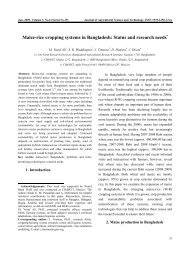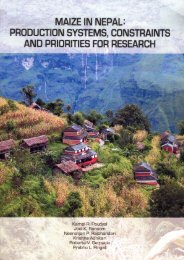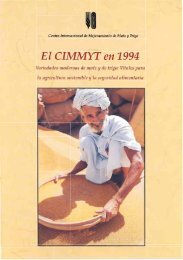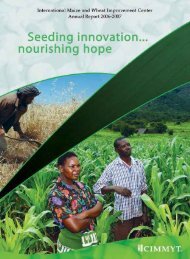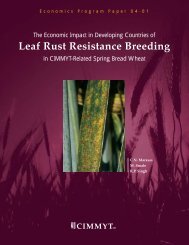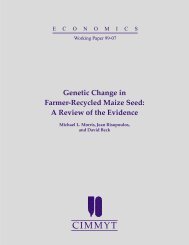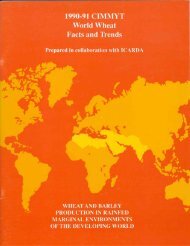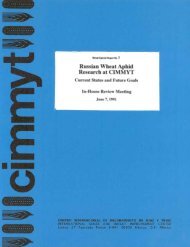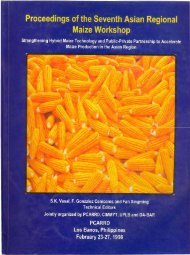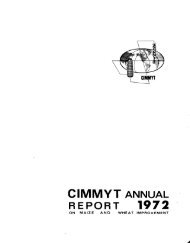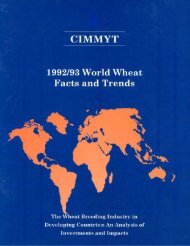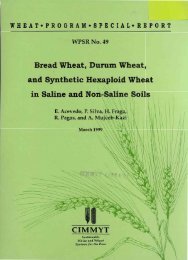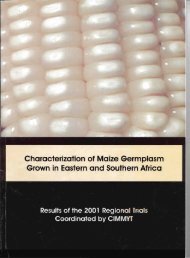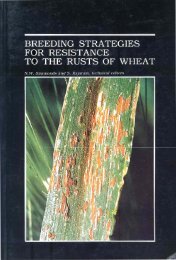the Symposium on Wheats for More Tropical Environments - cimmyt
the Symposium on Wheats for More Tropical Environments - cimmyt
the Symposium on Wheats for More Tropical Environments - cimmyt
- No tags were found...
Create successful ePaper yourself
Turn your PDF publications into a flip-book with our unique Google optimized e-Paper software.
The Relative Priority andEc<strong>on</strong>omics of Growing Wheat in NigeriaA.a. OgUDgblle, Institute <strong>for</strong> Agricultural Research, Ahmadu BelloUniversity, Zaria, NigeriaAbstractThe main aims of <str<strong>on</strong>g>the</str<strong>on</strong>g> Nigerian government policy ofproducing wheat <strong>on</strong> largescaleirrigati<strong>on</strong> schemes were to substantially increasefood producti<strong>on</strong> and toachieve import substituti<strong>on</strong> objectives. Many years after <str<strong>on</strong>g>the</str<strong>on</strong>g> establishment of <str<strong>on</strong>g>the</str<strong>on</strong>g>projects. those objectives are stillfarfrom beingfuifUled. Although wheatproducti<strong>on</strong> appears more profitable than some cereal crop enterprises. averageyields have remained lower than <str<strong>on</strong>g>the</str<strong>on</strong>g> potential. Timely planting. better inputdelivery and improved extensi<strong>on</strong> services arefactors crucial to achievingproducti<strong>on</strong> increases. Local market prices are higher than <str<strong>on</strong>g>the</str<strong>on</strong>g> governmentproducer price and, <str<strong>on</strong>g>the</str<strong>on</strong>g>re<strong>for</strong>e. farmers do not sell to <str<strong>on</strong>g>the</str<strong>on</strong>g>.flour mills.327Wheat has been grown traditi<strong>on</strong>ally in<str<strong>on</strong>g>the</str<strong>on</strong>g> river valleys in <str<strong>on</strong>g>the</str<strong>on</strong>g> nor<str<strong>on</strong>g>the</str<strong>on</strong>g>rn parts ofNigeria <strong>for</strong> many years. However. earlyproducti<strong>on</strong> was <strong>on</strong> a small scale. with<str<strong>on</strong>g>the</str<strong>on</strong>g> grain being sold in local markets asa luxury product used <strong>for</strong> makingtraditi<strong>on</strong>al dishes (4). Its importance in<str<strong>on</strong>g>the</str<strong>on</strong>g> diet of <str<strong>on</strong>g>the</str<strong>on</strong>g> people has increaseddramatically in recent years withincreases in income and populati<strong>on</strong>.Annual wheat importati<strong>on</strong> rose fromabout 190.000 t<strong>on</strong>s in 1969 to about1.5 milli<strong>on</strong> t<strong>on</strong>s in 1983. costing <str<strong>on</strong>g>the</str<strong>on</strong>g>country nearly US$ 290 milli<strong>on</strong> in<strong>for</strong>eign exchange. A total of US$ 1.95billi<strong>on</strong> was spent <strong>on</strong> food imports in1980 (5). with wheat c<strong>on</strong>stituting <str<strong>on</strong>g>the</str<strong>on</strong>g>single largest item in Nigeria's heavyfood import bill. The sudden popularityof wheat bread in <str<strong>on</strong>g>the</str<strong>on</strong>g> Nigerian diet. and<str<strong>on</strong>g>the</str<strong>on</strong>g> c<strong>on</strong>sequent increase in wheatimportati<strong>on</strong>. prompted <str<strong>on</strong>g>the</str<strong>on</strong>g> Nigeriangovernment to encourage <str<strong>on</strong>g>the</str<strong>on</strong>g>producti<strong>on</strong> of wheat in substantialquantities domestically.Objectives of <str<strong>on</strong>g>the</str<strong>on</strong>g> WheatProducti<strong>on</strong> and Water ResourceDevelopment PolleyGovernment encouragement ofdomestic wheat producti<strong>on</strong> <strong>for</strong> flourcannot be isolated from <str<strong>on</strong>g>the</str<strong>on</strong>g> agriculturalpolicy of achieving self-suffiCiency infood producti<strong>on</strong> and promoting <str<strong>on</strong>g>the</str<strong>on</strong>g>welfare of <str<strong>on</strong>g>the</str<strong>on</strong>g> rural people. The mainobjectives of domestic wheat producti<strong>on</strong>are 1) to stimulate substituti<strong>on</strong> <strong>for</strong>imported wheat in order to improve <str<strong>on</strong>g>the</str<strong>on</strong>g>balance of payment situati<strong>on</strong>. 2) topromote agro-industrtal developmentand 3) to enhance food producti<strong>on</strong>ef<strong>for</strong>ts (1).The majority of <str<strong>on</strong>g>the</str<strong>on</strong>g> wheat c<strong>on</strong>sumed inNigeria is in <str<strong>on</strong>g>the</str<strong>on</strong>g> <strong>for</strong>m of bread. In orderto facilitate <str<strong>on</strong>g>the</str<strong>on</strong>g> processing of wheat intoflour. a flour-milling industry wasc<strong>on</strong>sidered. not <strong>on</strong>ly as an integral partof <str<strong>on</strong>g>the</str<strong>on</strong>g> package of wheat producti<strong>on</strong>. butalso as an important agro-based infantindustry that would have to be protectedfrom <strong>for</strong>eign competiti<strong>on</strong>. This proVided<str<strong>on</strong>g>the</str<strong>on</strong>g> justificati<strong>on</strong> <strong>for</strong> increasing <str<strong>on</strong>g>the</str<strong>on</strong>g>number of flour mills to five by 1980.with a joint capacity of 1.2 milli<strong>on</strong> t<strong>on</strong>sof wheat per annum.Wheat Producti<strong>on</strong> andWater Resource DevelopmentSince <str<strong>on</strong>g>the</str<strong>on</strong>g> early 19708. increasedemphasis has been given to <str<strong>on</strong>g>the</str<strong>on</strong>g>development of irrigati<strong>on</strong>. as a means ofachieving <str<strong>on</strong>g>the</str<strong>on</strong>g> full agricultural potentialof <str<strong>on</strong>g>the</str<strong>on</strong>g> country (5). The Sahel drought of<str<strong>on</strong>g>the</str<strong>on</strong>g> early 19708 gave impetus to heavypublic investment in irrigati<strong>on</strong> schemes.About US$ 398.4 milli<strong>on</strong> and $2.95




